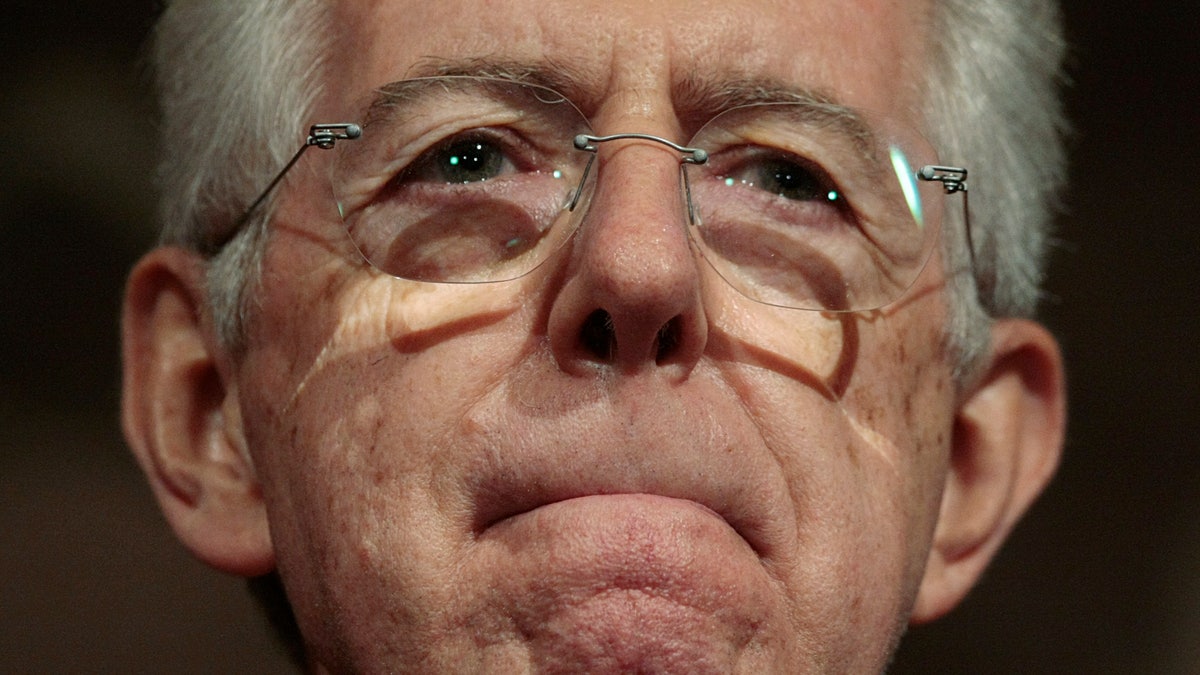
Nov. 15, 2011: Italy's premier-designate Mario Monti speaks to the media after finishing his meetings with Italian political leaders and organizations' representatives at the Senate, in Rome. (AP2011)
ROME (AP) -- Premier Mario Monti formed a new Italian government without a single politician Wednesday, drawing from the ranks of bankers, diplomats and business executives to create a team to steer Italy away from financial disaster.
The 68-year-old former European Union competition commissioner told reporters he will serve as Italy's economy minister as well as its premier as he seeks "sacrifices" from across the political spectrum to solve the economy's woes and get it growing again.
Monti and his new Cabinet ministers were sworn in at a solemn ceremony at the presidential palace, formally ending Silvio Berlusconi's 3 1/2-year-old government and the media mogul's 17-year-long political dominance.
Monti said he will lay out his emergency plan Thursday in the Senate before a confidence vote. A second vote, in the lower Chamber of Deputies, will follow, likely on Friday. He stressed that economic growth is a top priority.
Hopes for his new administration won Italy some respite in financial markets Wednesday. The yield on its 10-year bonds dropped 0.16 percentage point to 6.77 percent. In the last week, that borrowing rate had flirted over 7 percent -- the level that forced fellow eurozone members Greece, Ireland and Portugal to seek international bailouts.
Up until summer, Italy had mostly avoided the European debt turmoil despite having a jaw-dropping debt of euro1.9 trillion ($2.6 trillion), nearly 120 percent of its GDP. But after Berlusconi's frequent delays and backtracking on austerity and reform measures, markets lost faith that his government could fix Italy's economic issues.
Restoring confidence is crucial because, as the third-largest economy in the eurozone, Italy is too big for Europe to rescue. A debt default by Italy could break up the eurozone and shake the global economy.
Monti gave few hints about his political program Wednesday. Explaining why his Cabinet had no one from Italy's fractious political parties, Monti said he decided after talks with party leaders "that the non-presence of politicians in the government would help it."
German Chancellor Angel Merkel, who was critical of Berlusconi's efforts, sent her congratulations to the new premier. Spokesman Steffen Seibert expressed her hope Monti's government would carry out reforms "so that Italy can win back the trust of markets."
"She thinks very highly of him. He is an expert who knows the relations in Europe very well," he told reporters.
Monti's ministers include Corrado Passera, CEO of Italy's second-largest bank, Intesa Sanpaolo SpA, to head Economic Development and Infrastructure; Piero Gnudi, a longtime chairman of Enel utility company, as Tourism and Sport minister in a country heavily dependent on tourist revenues; and the current Italian ambassador to Washington, Giulio Terzi di Sant'Agata, to be foreign minister.
Monti said he put Passera in charge of economic development and infrastructure -- often split into two ministries -- to ensure good coordination on projects that can boost economic growth.
A historian of the Catholic church with close ties to the Vatican, Andrea Riccardi, was named minister of international and domestic cooperation, a choice that seemed to reward pro-Vatican lawmakers in Parliament.
Still, some of Monti's choices raised some eyebrows.
"This government -- ties to banks, to business, to the Vatican, to private universities, to the usual names -- is the opposite of what this country needs," said Paolo Ferrero, leader of Rifondazione Comunista, a tiny, far-left party.
